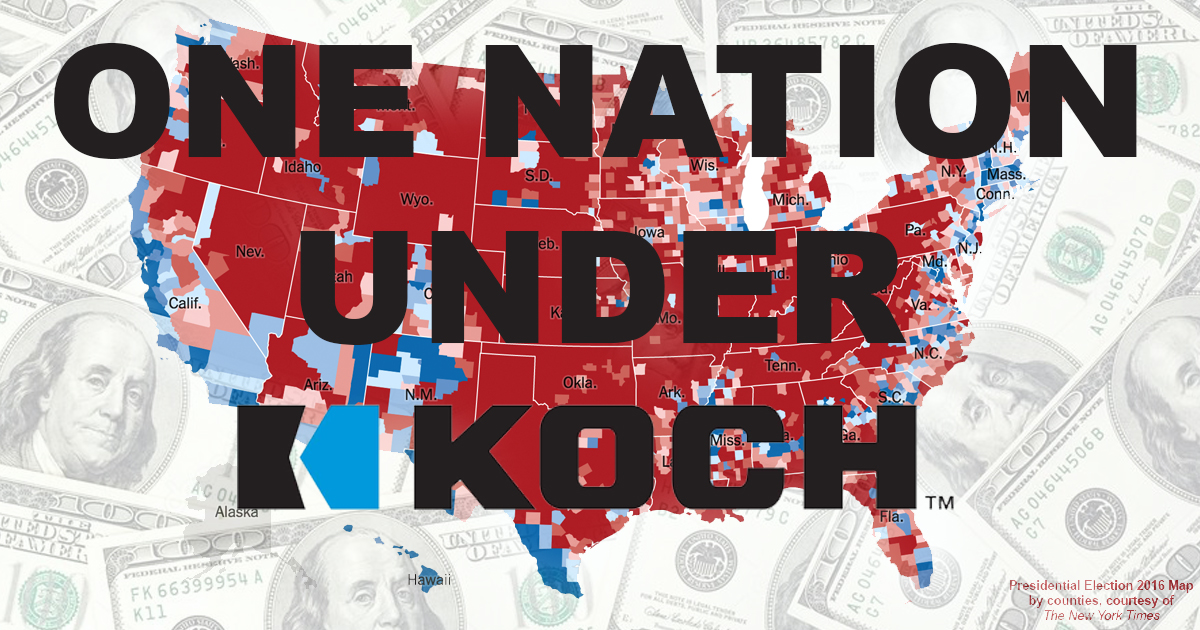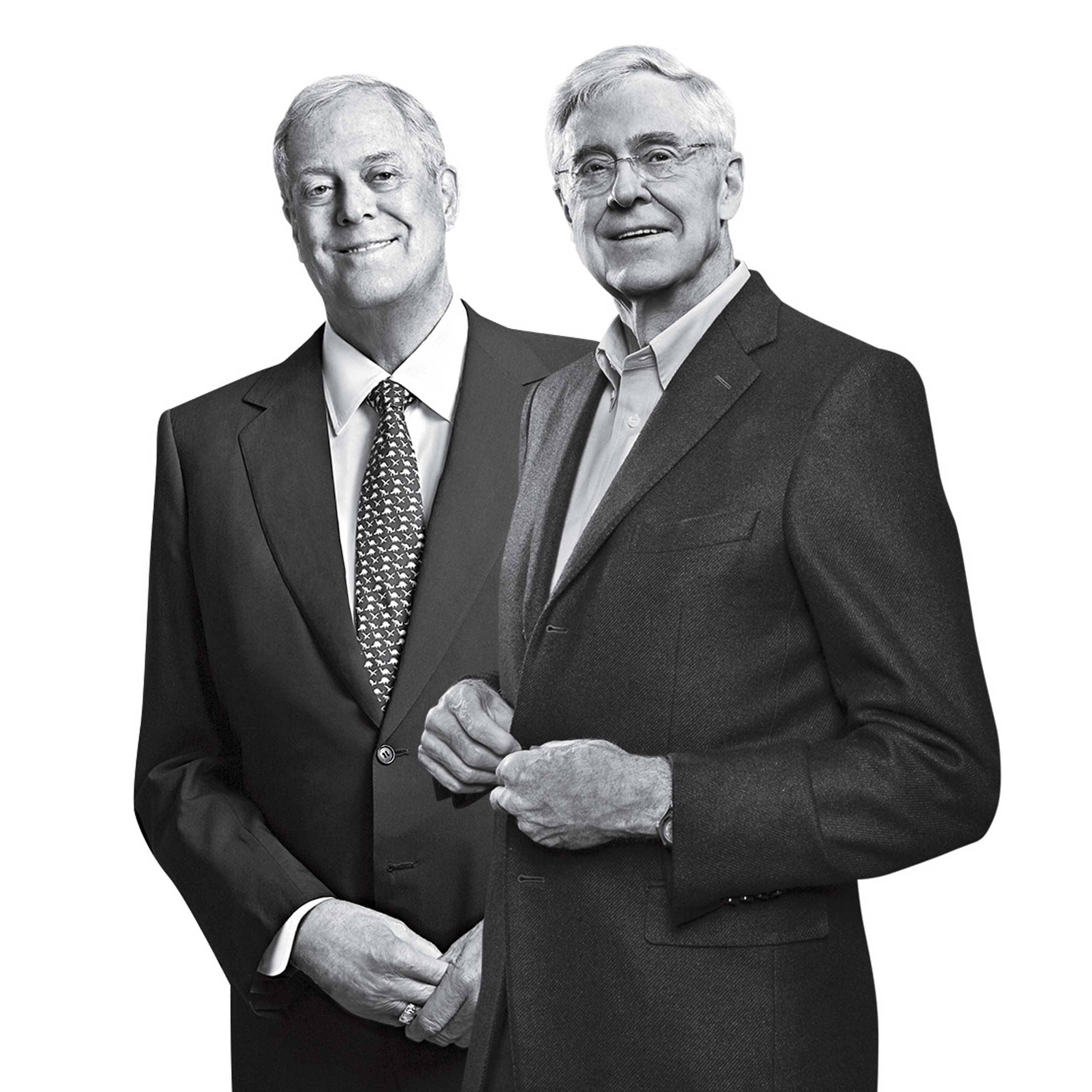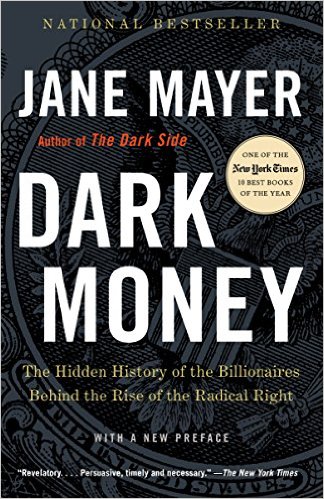
“We must make our choice. We may have democracy, or we may have wealth concentrated in the hands of a few, but we can’t have both.” – Louis Brandeis
Overview
In Dark Money: The Hidden History of the Billionaires Behind the Rise of the Radical Right, investigative journalist Jane Mayer meticulously uncovers the political machine built by billionaires, and the Koch brothers, in particular, that dragged the Republican party to the far right over several decades.
For those unfamiliar with Charles and David Koch, the billionaire brothers who inherited a private multi-million dollar oil refining business, they advocate libertarian, free-market economics and are socially liberal. Well, they hardly “advocate” for ideas.
Rather, they plow unpopular ideas into the American mainstream by founding partisan think-tanks like the Cato Institute, which Charles tightly controls, funding revisionist academia, lobbying through non-profit “social welfare” organizations, and, of course, investing in right-wing politicians competing in everything from local races to the presidency.
The Koch brothers’ ideas include abolishing Medicare, Social Security, labor laws, environmental regulations, taxes, and essentially everything else the government does. Notably, President Reagen, the conservative idol, was less conservative than the Kochs.
For example, he never proposed abolishing Social Security. In fact, he engaged in a bipartisan effort to preserve the system, protecting our senior citizens. And yet, the Republican Party has embraced radical anti-government ideas, shifting it significantly to the right of the Gipper.
The sprawling political apparatus, funded by unaccountable “dark money,” that produced an ideological shift in the GOP is referred to as the “Kochtopus.”
Kochtopus: Your Democracy’s Worst Nightmare
The brothers built the Kochtopus out of necessity. For too long, the Kochs were unable to get anyone to buy into their libertarian vision. Moreover, as the public began to understand the threat of climate change, there was an increasing likelihood that legislation harmful to Koch Industries would emerge.
Thus, they preempted laws by promoting climate change denial and supporting candidates who treated science as a conspiracy. Indeed, from 2005 to 2008, the Kochs “poured almost $25 million into dozens of different organizations fighting climate reform.” They had outspent ExxonMobil by a factor of three. Their opposition to necessary regulations doesn’t end with greenhouse gases, though.
Indeed, they oppose regulations protecting you and your family from benzene emissions (a known carcinogen), and laws requiring them to maintain the safety of gas lines, which can (and unfortunately, did, on at least one occasion) explode. They oppose all regulations, no matter how detrimental to society deregulation may be.
Buying Influence

While there are several right-wing billionaires Mayer discusses (Joe Coors, the DeVos family, Richard Scaife, John Olin, and others), none have done more to distort our democracy and control the government than the Kochs.
The brothers’ goal from the beginning was to convince Americans that government can’t be trusted, is ineffective, and that liberty can only exist in its absence. In other words, “to rip out government at the root.” They have inarguably been enormously successful.
For instance, Paul Ryan’s proposed budget in 2011 called for radical austerity, based on an anti-government philosophy. According to an analysis of the Ryan plan, “1.8 million people would be cut off food stamps, 280,000 children would lose their school lunch subsidies, and 300,000 children would lose medical care.”
Luckily for the Kochs and their rich friends, the wealthiest Americans would get a $2.4 trillion tax break compared to President Obama’s budget plan. Proposing a rewrite of the American social contract this far right and still managing to get elected speaks volumes to the Koch’s influence.
“On its own, in 2012 the Kochs’ network of a few hundred individuals spent at least $407 million, almost all of it anonymously. This was more than John McCain spent on his entire 2008 presidential bid. And it was more than the combined contributions to the two presidential campaigns made by 5,667,658 Americans, whose donations were legally capped at $5,000.” – Dark Money
Conclusion
Dark Money is thrilling, fascinating, and informative. There is no happy ending, unfortunately. I read some of the book on July 4th, the day we celebrate our cherished nation’s independence.
I should have felt proud of America, but instead, my heart hurt because the book paints a clear picture of our democracy under assault. It may make you cynical; perhaps it’ll convince you that America is more of a plutocracy than a democracy.
Nevertheless, I finished the book full of optimism. I’m optimistic because there is strong bipartisan support for campaign finance reform. For the most part, we don’t like it when rich people try to control our politics, whether the money is coming from George Soros or Charles and David Koch.
If we intend to unwrap the Kochtopus’ tentacles from our government, it’ll take high levels of civic engagement and meaningful campaign finance reform.
Among other things, necessary reforms may include enfranchisement expansion; changes to the tax code; overturning Citizens United; and enabling politicians to succeed without money from the wealthiest Americans. It’s difficult, but it’s imperative.
I hope you read Dark Money and that it inspires you to action.

Interesting. I read the book that began with the patriarch of the Koch brothers, the history of that family and how they grew their influence through time. The well known politicians who attend annual grandiose gatherings to set their “platform “, etc. Money is, indeed, the root of all evil!
It’s true! Thanks for reading, Judy! 🙂